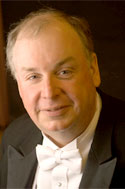Message from the Chair
 Music, it seems, has been an indelible expression of humanity found throughout the world, spanning countless generations. Not too surprisingly, writing about music seems to have the same ubiquitous quality—and the same transcendent ability to move the emotions and the mind. Plato said, "Music is a moral law. It gives soul to the universe, wings to the mind, flight to the imagination, and charm and gaiety to life and to everything." The ancient Chinese philosopher Mencius recognized, "If the King loves music, it is well with the land." The Bengali Nobel laureate Rabindranath Tagore wrote, "Music fills the infinite between two souls." Finally, Confucius said, "Music produces a kind of pleasure that human nature cannot do without."
Music, it seems, has been an indelible expression of humanity found throughout the world, spanning countless generations. Not too surprisingly, writing about music seems to have the same ubiquitous quality—and the same transcendent ability to move the emotions and the mind. Plato said, "Music is a moral law. It gives soul to the universe, wings to the mind, flight to the imagination, and charm and gaiety to life and to everything." The ancient Chinese philosopher Mencius recognized, "If the King loves music, it is well with the land." The Bengali Nobel laureate Rabindranath Tagore wrote, "Music fills the infinite between two souls." Finally, Confucius said, "Music produces a kind of pleasure that human nature cannot do without."
These great philosophers recognized the importance of music on multiple levels, from the intensely personal up to the realm of the state. It's nice to know—philosophically speaking—that they've got our backs! We spend our time performing and studying music from around the world and across many centuries; all the while, there are those who are busy creating glorious new music. This music—in all of its forms—is shared with our community, and sometimes beyond. This widespread musical life gives me—thankfully—an optimism at odds with most current worldviews. I think that another philosopher, Nietzsche, pretty much summed up the reasons for my optimism succinctly: "Without music, life would be a mistake."
W. Terrence Spiller, Chair

